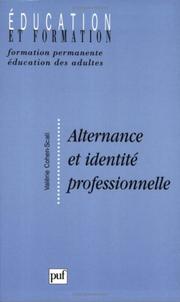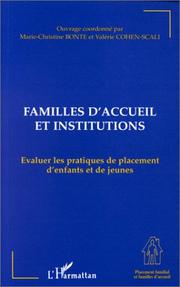| Listing 1 - 10 of 14 | << page >> |
Sort by
|
Book
ISBN: 2100810812 9782100810819 Year: 2021 Publisher: Malakoff: Dunod,
Abstract | Keywords | Export | Availability | Bookmark
 Loading...
Loading...Choose an application
- Reference Manager
- EndNote
- RefWorks (Direct export to RefWorks)
L’orientation renvoie de manière classique à deux grands ensembles d’activités. D’une part, elle correspond à la sélection et la répartition des individus sur le marché du travail. Selon cette perspective, l’orientation est une pratique susceptible de permettre aux entreprises de recruter plus facilement des individus dont les compétences et profils sont adaptés à leurs besoins. D’autre part, l’orientation s’entend également comme un ensemble de dispositifs permettant d’aider les individus à faire des choix pour construire leur vie. Ces deux perspectives n’ont pas nécessairement les mêmes finalités. Le premier objectif de cet ouvrage collectif est de montrer la diversité des facettes et des enjeux associés au rôle de l’orientation dans ce contexte : l’orientation est à la fois un champ de pratiques et de recherche. Son second objectif est de mettre en exergue le caractère pluridisciplinaire des travaux du domaine de l’orientation, tel qu’il serait possible de parler « des sciences de l’orientation ».
Book
ISBN: 9782130581055 2130581056 Year: 2010 Publisher: Paris: PUF,
Abstract | Keywords | Export | Availability | Bookmark
 Loading...
Loading...Choose an application
- Reference Manager
- EndNote
- RefWorks (Direct export to RefWorks)
College students --- Youth --- College students --- Youth

ISBN: 9782130501893 2130501893 Year: 2000 Publisher: Paris: PUF,
Abstract | Keywords | Export | Availability | Bookmark
 Loading...
Loading...Choose an application
- Reference Manager
- EndNote
- RefWorks (Direct export to RefWorks)
Enseignement en alternance --- Transition ecole-travail --- Identite professionnelle --- Insertion professionnelle --- Jeunes adultes
Book
ISBN: 9783866494626 Year: 2012 Publisher: Opladen Barbara Budrich
Abstract | Keywords | Export | Availability | Bookmark
 Loading...
Loading...Choose an application
- Reference Manager
- EndNote
- RefWorks (Direct export to RefWorks)
Book
ISBN: 213074110X Year: 2010 Publisher: Paris (6, avenue Reille 75685) : P.U.F.,
Abstract | Keywords | Export | Availability | Bookmark
 Loading...
Loading...Choose an application
- Reference Manager
- EndNote
- RefWorks (Direct export to RefWorks)
Aujourd'hui, près de 4 millions de jeunes travaillent en faisant des études. Les bénéfices de ces activités pour les jeunes sont variés (assurer ses études, en premier lieu, mais aussi développer son indépendance, accéder à des loisirs parfois onéreux, enrichir son CV de façon à augmenter son employabilité…) mais peuvent également avoir des effets délétères sur la poursuite de leur cursus. Cet ouvrage, tout en en évoquant ces constats, développe une approche psychosociale des jeunes qui travaillent en faisant leurs études. Il propose une analyse de la place de ces expériences de travail sur les intentions d'orientation professionnelle et sur la construction de soi de jeunes adultes majoritairement issus de milieux populaires. Les analyses théoriques s'appuient sur les théories de l'identité et des représentations sociales. Plusieurs enquêtes de terrain réalisées dans des situations d'apprentissage, de stages en entreprise et de petits boulots d'étudiants mettent en évidence l'importance de ces activités de travail sur les représentations de soi et du futur ainsi que le rôle de la qualité des situations de travail proposées par les entreprises qui les emploient. Par là, se trouvent mis en relief les principaux enjeux de ces expériences professionnelles pour l'avenir des jeunes.
Book
ISBN: 2100822381 Year: 2021 Publisher: Paris (5 Rue Laromiguière 75005) : Dunod,
Abstract | Keywords | Export | Availability | Bookmark
 Loading...
Loading...Choose an application
- Reference Manager
- EndNote
- RefWorks (Direct export to RefWorks)
L'orientation renvoie de manière classique à deux grands ensembles d'activités. D'une part, elle correspond à la sélection et la répartition des individus sur le marché du travail. Selon cette perspective, l'orientation est une pratique susceptible de permettre aux entreprises de recruter plus facilement des individus dont les compétences et profils sont adaptés à leurs besoins. D'autre part, l'orientation s'entend également comme un ensemble de dispositifs permettant d'aider les individus à faire des choix pour construire leur vie. Ces deux perspectives n'ont pas nécessairement les mêmes finalités. Le premier objectif de cet ouvrage collectif est de montrer la diversité des facettes et des enjeux associés au rôle de l'orientation dans ce contexte : l'orientation est à la fois un champ de pratiques et de recherche. Son second objectif est de mettre en exergue le caractère pluridisciplinaire des travaux du domaine de l'orientation, tel qu'il serait possible de parler « des sciences de l'orientation ».
Book
ISBN: 3319614762 3319614754 Year: 2018 Publisher: Cham : Springer International Publishing : Imprint: Springer,
Abstract | Keywords | Export | Availability | Bookmark
 Loading...
Loading...Choose an application
- Reference Manager
- EndNote
- RefWorks (Direct export to RefWorks)
In industrialized societies, individuals are facing major challenges that mobilize many of their psychological and social resources. The world of work is changing constantly. Adults have to adapt their technical skills and knowledge continuously. For teenagers and young adults, choosing a vocation and constructing their future career paths is becoming increasingly difficult. The migration of people and the globalization of the workforce raise questions about social inclusion and the future of affected individuals. These examples highlight of the importance of the field of Career Counseling and Guidance to support citizens individually and collectively in building their future. The challenges our societies face demonstrate how crucial the development of research in this field is. The European Doctoral Programme in Career Guidance and Counselling (ECADOC), funded by the European Commission from 2013-2016, has brought together PhD students working on burning issues in this field, using various theoretical references and methodologies. The four parts of this book present a selection of innovative research aiming to find answers to the named challenges. Part 1 deals with key psychological processes involved in career construction of young adults. Part 2 presents research concerning transitions over the course of life. Part 3 covers research related to interventions of career guidance and counseling. Part 4 outlines perspectives for the future and proposes a European Research Agenda for our field of research. Perspectives on Current Research in Career Guidance and Counseling – Building Careers in Changing and Diverse Societies is dedicated to students, researchers and practitioners in the fields of education, career guidance, psychology, human resource management to inform them about very recent work and promote the development of innovative interventions and programmes.
Education. --- International education. --- Comparative education. --- Teaching. --- Learning & Instruction. --- Teaching and Teacher Education. --- International and Comparative Education. --- Vocational guidance --- Educational counseling --- Educational guidance --- Guidance, Educational --- Guidance, School --- Guidance, Student --- Personnel service in education --- School counseling --- School guidance --- Student counseling --- Student guidance --- Students --- Counseling --- School principal-counselor relationships --- Business, Choice of --- Career choice --- Career counseling --- Career patterns --- Career planning --- Careers --- Choice of profession --- Guidance, Vocational --- Occupation, Choice of --- Occupational choice --- Profession, Choice of --- Vocation, Choice of --- Vocational opportunities --- Occupations --- Professions --- Counseling of --- Learning. --- Instruction. --- International education . --- Education, Comparative --- Education --- Global education --- Intellectual cooperation --- Internationalism --- Didactics --- Instruction --- Pedagogy --- School teaching --- Schoolteaching --- Instructional systems --- Pedagogical content knowledge --- Training --- Learning process --- Comprehension --- History
Book
ISBN: 3866495145 3866494629 Year: 2012 Publisher: Leverkusen Verlag Barbara Budrich
Abstract | Keywords | Export | Availability | Bookmark
 Loading...
Loading...Choose an application
- Reference Manager
- EndNote
- RefWorks (Direct export to RefWorks)
What are today's main concepts and theories - and the main stakes - associated with the issue of competences in organisations? Several topics are discussed, including competence issues regarding the evolution of work, professionalisation, competence evaluation, competence management, and the competences of adult educators and trainers, as well as European policies regarding competence needs and development. From the Contents: Changes in Work and Competences Professionalisation and the Development of Competences in Education and Training The Role of Professional Didactics in Skills Development for Training and Education Professionals Competence Evaluation Processes in Adult Education Competence Management and Adult Education Changes in Vocational Training and New Models of Competences for Individuals Der Sammelband bietet eine Einführung in die französische Kompetenzdebatte, insbesondere in der beruflichen Weiterbildung und am Arbeitsplatz. DIE Zeitschrift für Erwachsenenbildung 4/2012
Employees --- Core competencies. --- Skilled labor. --- Labor productivity --- Continuing education. --- Education --- Labor --- Competence, Core --- Competencies, Core --- Core competence --- Ability --- Employee development --- Employee training --- Employees, Training of --- In-service training --- Inservice training --- On-the-job training --- Training of employees --- Training within industry --- Vestibule schools --- Occupational training --- Employer-supported education --- Lifelong education --- Lifelong learning --- Permanent education --- Recurrent education --- Adult education --- Training of. --- Effect of education on. --- Adult Education --- Adult Learning --- Competence Development --- Europe. --- Council of Europe countries --- Eastern Hemisphere --- Eurasia --- Didactic method --- Vocational education
Book
ISBN: 2917296283 9782917296288 Year: 2017 Publisher: Paris: Qui plus est,
Abstract | Keywords | Export | Availability | Bookmark
 Loading...
Loading...Choose an application
- Reference Manager
- EndNote
- RefWorks (Direct export to RefWorks)

ISBN: 2738467172 9782738467171 Year: 1998 Publisher: Paris: L'Harmattan,
Abstract | Keywords | Export | Availability | Bookmark
 Loading...
Loading...Choose an application
- Reference Manager
- EndNote
- RefWorks (Direct export to RefWorks)
| Listing 1 - 10 of 14 | << page >> |
Sort by
|

 Search
Search Feedback
Feedback About UniCat
About UniCat  Help
Help News
News